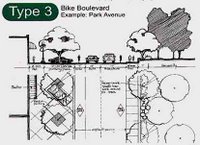Boulevards sans Bruit

As we talk about climate change and peak oil and how we can respond to it, it's important to constantly remind ourselves that many of our best solutions will actually bring us a higher quality of living. More bikes, more bike highways, more local food, commuter rail and electric trolleys, real neighborhoods, and less pollution aren't the end of the world.
Well, the end of that world maybe, but many of these changes will be good for us.
Here is a story from The Oregonian
Cyclists will have streets to call their own
"Bike boulevards"
Portland aims to develop more of the safe residential roads
Friday, June 16, 2006
JEFF MAPES
"One of the best parts of Sarah Bott's day is when she reaches the end of the bike lane on North Williams Street, glides past a traffic barrier and plunges into one of Portland's "bike boulevards."
The trees are large and stately; the auto traffic is light. It sounds corny, she admits, but she can smell the flowers and hear the birds.
"That's when my bike commute turns from a grind into a joyful part of my day," says Bott, who works for the city Water Bureau.
Bike boulevards are becoming so popular that some appear to carry more bikes than cars along certain stretches and have become a central part of neighborhoods' ambience.
City officials and bike advocates are redoubling their efforts to develop more bike boulevards to attract a new wave of riders who are interested in bicycling but want to stay off busy streets.
(snip)
Portland has about 30 miles of bike boulevards, where the city uses a variety of traffic-calming techniques to provide safe and attractive cycling routes along mostly residential streets.
For several years, though, bike boulevards were something of an afterthought while the city concentrated on developing an extensive network of bike lanes, now totaling 165 miles, that criss-cross much of Portland, mostly on arterial streets.
Those bike lanes helped double ridership in the past decade -- by some estimates 3 percent of all commuter trips are by bicycle -- and cemented Portland's reputation as one of the nation's best bike cities. But many cyclists said they didn't like the idea of riding on high-speed streets, separated from cars by a line of paint.
Bells and wheels
Some of the bike boulevards have become so popular that the character of the street has changed. Along the Lincoln-Harrison bike boulevard, neighbors talk about a street dominated by the sounds of swirling bike wheels, tinkling bells and brief snatches of conversations from passing riders.
"I like it because it's a community feel," says Jon Berry, who lives on Southeast Lincoln Street and often bicycles to his work at a brewery in Northwest Portland. "My wife and I often sit out in front and have a cocktail and watch the bikes go by. I guess I like looking at bikes more than cars."
Mia Birk, the city's former bike coordinator, also lives on Lincoln. "The presence of all the bicycles has a real traffic calming effect," she says. "Cars cede the right of way, the privileges they have on other streets. They go really slow."
(snip)
Commissioner Sam Adams, who heads the city's Transportation Department and is the driving force behind the bike summit, says he wants to explore other ideas beyond the boulevards. He wants to look at wider bike lanes and is moving to set up a test of a separated bikeway -- common in Europe -- where riders are protected from cars.
"I'm talking about (competing with) world-class biking communities," Adams says. "My goal is to exceed their ridership."
When I returned from Amsterdam,
the one story I kept telling was of the "jam packed to the rails"
4 story Bike Parking facility next to the train station.
I suppose those of us who live in the sweltering heat of the sub-tropics,
have a hard time imagining not having a car with AC to hide in,
But watching a young mother with her groceries on the rear rack,
with her young daughter perched on the seat right in front of her,
riding in 0 degree C. weather,
makes me think that showers and lockers in the work place
will go a long way to solving those real issues.
And, if we develop road ways for bikes, and light electric scooters,
and streets that are a joy to walk and shop and chat on,
We will find that a funny thing will happen to our towns and cities,
They will become alive and vibrant and healthy.
and sans bruit.
HOME
What it is About
Earthfamily Principles
Earthfamilyalpha Content II
Earthfamilyalpha Content
Links
LANGUAGE TRANSLATIONS
drawings courtesy of arizona.edu
0 Comments:
Post a Comment
<< Home